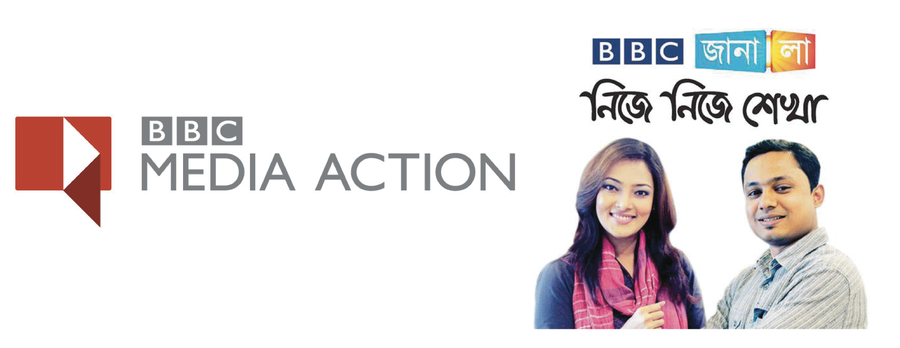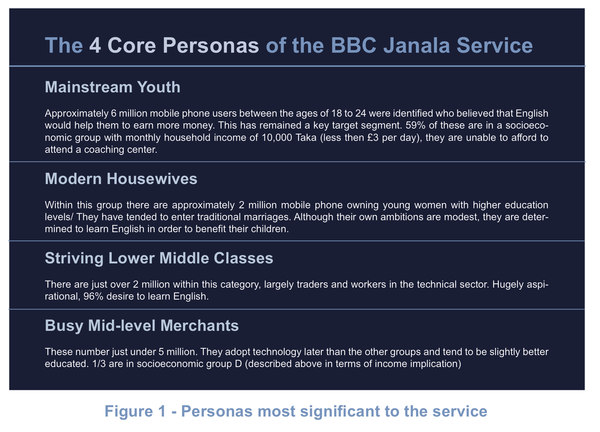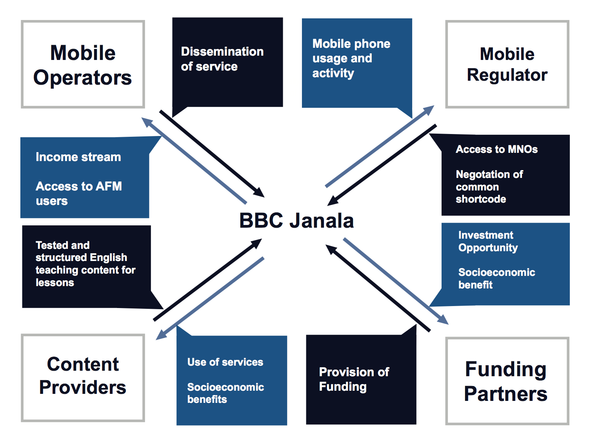
BBC Janala is an adult-focused English teaching and learning programme designed for the Bangladeshi market. It is part of English in Action, a UK government-funded programme that works to raise standards of English learning in schools around the world. Operating with a multi-platform approach, it uses mobile technology and other media to connect its users with affordable, accessible, and culturally relevant English lessons in print, video and audio. Today, it reaches 28 million people across multiple regions and socioeconomic backgrounds, helping them to develop a standard of communicative English that will benefit them in the increasingly internationalised Bangladeshi economy. BBC Janala believes that, in doing so, they can boost individual incomes, bring about economic improvement across Bangladesh, and enhance the nation’s international economic standing..
Year Launched: 2008
Business Model: Donor, Government
Targeted Device: Basic Phone
Primary Delivery Technology: IVR
Products & Services: English language lessons
Markets Deployed In: Bangladesh
Estimated Total Number of Users: 28 million
Estimated Number of Active Users: 10 million
BACKGROUND AND OPPORTUNITY:
In 2006, conversations between the UK and Bangladeshi governments began, focusing on the long-identified gap in English teaching and learning in Bangladesh, the cause of which is tied inextricably to the nation’s history.
The Bangladesh Liberation War of 1971, fought between Bangladesh (then East Pakistan) and West Pakistan was catalysed in part by the outlawing of the Bangla language. Post-independence, Bangladesh attached high importance to their national language, which led to the marginalisation of the teaching of English in the 1970s and 1980s. As a result, although recognition of the value of learning English has grown over the past 30 years, the current generation are progressing through a school system that isn’t well-equipped to teach it.
The international economic statuses of neighbouring countries, principally India where English was ubiquitous, contributed to the Bangladeshi government’s belief that improved and further-reaching English teaching would increase people’s ability to work abroad, enable the country to leverage more foreign investment, and improve links with the global economy.
This led to the conversations with the UK government through which English in Action – of which BBC Janala makes up the adult-focused component – was born. The channels used for the service were determined according to the existing media landscape in Bangladesh. While both internet and radio were low (though growing), there was a fair degree of television penetration, and mobile was nearly ubiquitous – 97% of people had access to a mobile phone. In order for it be as accessible as possible across Bangladeshi society, BBC Janala was therefore launched as a multi-platform service with particular focus on mobile as a method of delivering content.
OBJECTIVE:
The overarching objective of BBC Janala is to benefit the Bangladeshi economy through allowing adults across socioeconomic groups to learn English on their own, at low cost, and in a way that breaks down existing barriers. The resulting improvement in Bangladeshis’ English language skills will aid the economic development of the country.
RESULTS:
- 56% of which have shown competency increases
- 28 million people have used the service on more than one platform
- 80% of which are rural
- 80% of which come from the lower 2 socioeconomic groups
- 44 million people aware
- In a country of 160 million, 1/3 adults have engaged with BBC Janala
IMPACT:
BBC Janala has data that evidences a significant correlation between English language competency and income. The service estimates that their users experience a 20-25% increase in income as a result of attaining an intermediate level of spoken English, compared to someone who speaks no English at all.
LESSONS LEARNED:
- Use a multi-platform approach – This can increase the effectiveness of services like BBC Janala. People learn, experience and consume things differently. A multi-platform approach better caters to this and increases the service’s exposure, as there are more ways for people to be made aware of it.
- The brand is more than important; it’s vital – BBC Janala has achieved its current standing across Bangladesh thanks to its clear, coherent, respected and well-understood brand.
- Content is king – Even the best brand in the world can’t make up for poor content. BBC Janala invest huge amounts of time in investigating and developing new content that is culturally sensitive and relevant to the everyday lives of Bangladeshis.
APPROACH:
The service was developed through extensive formative research. In assessing potential uptake, people’s motivations and barriers to accessing a mobile-based English learning service were identified. For example, in 2008, around 80% of adults expressed a desire to learn English. Primary motivations for doing so included finding better paid employment and helping their children to learn English. Despite the high penetration of mobile technology, most people were only using their phones to make calls. This was due in part to SMS usage being limited by the absence of a standardised way of writing Bangla in Roman script.
Following this, much piloting and pre-testing was required to solidify the service prior to launch. This included testing content 4-5 times to ensure that it was suitable and of consistent quality across modules. Significant throughout was a desire to teach communicative English: speaking and listening, as opposed to reading and writing. Combined with limitations on SMS usage, this led the team to selecting Interactive Voice Response (IVR) as the most suitable technology for the mobile components of their programme. This focus on communicative English also reinforced their intention to make the service relevant and culturally sensitive to Bangladeshis. For this reason, the service didn’t adapt generic English teaching content, instead featuring only original content that had been exclusively designed for the Bangladeshi market.
After refining the programme, BBC Janala launched at scale in 2008 with a primary delivery mechanism of 3-minute audio lessons, along with occasional Dual-Tone Multi-Frequency-based quizzes. At the time, a new lesson that coincided with the content of the TV component would be launched every week. This was largely successful: by the end of 2011, they had 6 million active users across platforms. However, further customer research highlighted areas of the service which could evolve to become more effective. For example, originally users would have to wait for a week between lessons. However, many users expressed a desire for something more structured through which they could work at their own pace. BBC Janala responded with progressive language courses from 2012 onwards. At present, users can phone at any time to receive sequential lessons, with the system bookmarking users’ progress and allowing them to pick up from their last completed lesson at any point. Once a user completes the course, they can go online to receive a report recognising their completion of the course.
Another way in which the service has changed is the way in which it generates content. At first, BBC Janala was working closely with BBC Learning English, a longstanding part of the BBC World Service. BBC Janala benefited from their partner’s pedagogical knowledge and experience in structuring English language learning to develop their initial content. However, over time this process has been done more in-house, owing in part to an evolving English teaching and learning sector in Bangladesh that is perfectly able to create tailored and relevant teaching content.
USER CENTRIC ATTITUDES:
The service has a deliberate focus on targeting underserved people from lower socioeconomic groups. It has a demonstrably wide reach, with 80% of its users coming from rural areas – to whom such a service would have been inaccessible had it not been so thoroughly tailored for them. This was aided by BBC Janala’s successful negotiations with MNOs to reduce the cost of using the service to approximately 25% of standard IVR services, making it more affordable. Additionally, a conscious effort was made to ensure that the service was attractive and accessible to women. As of 2014, more women are using the product than men. This is thought to be in part due to the inclusion of female voices and role models in their lessons, as well as featuring topics that are relevant to Bangladeshi women.

THE USE AND VALUE OF DATA:
The collection of user data is a naturally occurring outcome of the BBC Janala service. Through people registering and using the service, BBC Janala collect phone numbers, location data and usage information. This data is then aggregated by a commercial partner. On a daily basis, this is fed into reports and dashboards which help the team to track and improve the service. For example, they can see points across the courses where users are slowing down or even dropping off entirely. Through observing these usage patterns, issues with the content can be identified – for example if one section is too difficult, or is experiencing technical issues. Visibility of the usage data allows them to target edits to the content where it is needed to increase its effectiveness and accessibility.
The contact information collected through the service allows them to hold real conversations with users regarding their experience of the service – particularly what they found most valuable, and what aspects could be improved. Alongside this, focus groups and large-scale surveys allow BBC Janala to collect feedback from users, as well as personal and economic information. This enables the service to build user profiles and better assess its impact across different socioeconomic groups.
SUCCESS AND SCALABILITY:
BBC Janala measures its success using three key metrics. Firstly, it considers the number of highly-engaged users as an indicator of the reach and impact of the service. This currently stands at around 10 million, having increased by 50% over the last 3 years. The second of these is attitudinal change. This comes down to whether users’ confidence and motivation are visibly increasing. This is measured through occasional representative surveys, 3 of which have been carried out to date. The last of these showed 48% of users expressing greater motivation to learn English. Finally, the team assess users’ confidence and competency in using English. This is measured through language tests, as well as self-assessments in representative surveys. In the latest round of these surveys, 42% of users demonstrated increased confidence in using communicative English.
In terms of scaling the service, BBC Janala is currently satisfied with their levels of engagement and reach across Bangladesh: in a country of 160 million, 1 in every 3 adults is aware of the service. As a result, growing and expanding the service geographically is not currently a priority.
One area which could be developed is the range of available content. Up to now, the focus has always been on teaching basic and intermediate English. However, as the Bangladeshi economy becomes more internationalised with more foreign investment entering the country, there is a growing need for specialised courses such as English for business, English for tourism and English for manufacturing. An expansion into this area has the potential to bring back a number of people who have benefited from the basic English courses, as well as attracting new ones.
PARTNERSHIPS:
The BBC Janala service is reliant on a number of key partnerships – hundreds in total – which fall into three primary categories.
The first of these categories is MNOs (Mobile Network Operators). Given the nature of the service, functional relationships with MNOs are crucial for BBC Janala. In establishing them, they were helped by the Bangladesh Telecommunication Regulatory Commission (BTRC) who facilitated meetings between BBC Janala and the 6 primary MNOs in Bangladesh. As a result, BBC Janala work with all of these 6 parties to circulate their service, resulting in a high number of customers to which they have access. The specific benefits of this have included a mutually agreed reduction of call costs to BBC Janala from 2 BDT per minute to 0.5 BDT. What’s more, BBC Janala, the BTRC, and the 6 operators together negotiated a common short code that could be used to access the service across all operators.
Secondly, BBC Janala works closely with is content providers. It initially worked with BBC Learning English – part of BBC World Service – to generate and structure suitable material for their lessons. Over time, the service has become more capable of developing such content in-house. However, the guidance and contributions of BBC Learning English were vital to the initial development of the service. Its relationship with the BBC also influences its data and privacy policies, and they aim to work within the BBC’s editorial guidelines
Finally, BBC Janala currently relies on external funding from donors. Despite being a part of the BBC, it receives no money from the UK’s Licence Fee. Rather, it is an independent charity that is funded primarily by lateral grants. Currently, the service is backed by the UK’s Department for International Development. This arrangement began following the conception of the service after conversations between the UK and Bangladeshi governments.

When it comes to establishing new partnerships, BBC Janala has certain standards to ensure that these are functional and successful. Firstly, it believes it is important to maintain regular communication between parties, both at the outset and throughout the operation of the project. If the person-to-person relationships are working smoothly, then the organisation-to-organisation relationships are easier and more fruitful. Additionally, it is important that expectations are clear and documented from the start. This way, there will be no confusion over responsibilities or misalignment of objectives.
CHALLENGES:
Measuring success is an ongoing challenge for BBC Janala. Though a useful indicator of reach, getting people engaging with the service is not enough. Similarly, while changes in motivation and confidence are important, they do not tell the whole story. Fundamentally, the project needs to demonstrate that those accessing the services were improving their English language ability. Doing so objectively has been a challenge as testing English levels of adults, outside of a classroom environment, is not widespread practice in the English language teaching industry. The project therefore developed its own, bespoke English testing tools specifically designed to be administered in dispersed settings with its target audience, in order to measure competence changes amongst service users.
Additionally, operating in Bangladesh has presented its own challenges. The country suffers from high levels of volatility and political instability. This has required a flexibility and perseverance on BBC Janala’s part, particularly in terms of planning interactions with users in the field.
FUTURE PLANS:
Based on user feedback and insights gained from the past six years of the service, BBC Janala has plans to expand its offering into higher-level language focusing on specific industry sectors. Funding for this expansion, however, is currently uncertain.
Sustaining the learning content and services already created by the programme is currently a key focus. In the future, BBC Janala would like to see the service being taken over and operated commercially. The service appears to be commercially sustainable, and there are already discussions underway about moving part of the existing service to a self-sustaining model in the next few months. The most expensive aspect of the current operation is the generation of new quality content. Care would need to be taken that this quality is maintained by any future leaders of the service – something that the industry in Bangladesh is currently not fully equipped to do.
This document was originally produced as part of the former Mobile for Development Impact programme.


